[vc_row][vc_column][vc_message message_box_color=”mulled_wine” icon_fontawesome=”fa fa-quote-left”]“I never wanted to write topical songs, have you heard my last two records, Bringing It All Back Home and Highway 61? It’s all there. That’s the real Dylan.”
~Bob Dylan (Frances Taylor Interview, Aug 1965)
[Highway 61] Oh yes, it goes from where I used to live… I used to live related to that highway. It ran right through my home town in Minnesota. I traveled it for a long period of time
actually. It goes down the middle of the country, sort of southwest…. lot of famous people came off that highway.
~Bob Dylan (John Cohen And Happy Traum Interview, June/July 1968)
Dylan’s sixth album and his first fully fledged eagle-flight into rock. Revolutionary and stunning, not just for its energy, freshness and panache but in its vision: fusing radical electric music—electric music as the embodiment of our whole out-of-control, nervouenergy-fuelled, chaotic civilization—with lyrics that were light-years ahead of anyone else’s, Dylan here unites the force of blues-based rock’n’roll with the power of poetry.
~Michael Gray (Bob Dylan Encyclopedia)[/vc_message][/vc_column][/vc_row]
Like a Rolling Stone:
How does it feel
How does it feel
To be without a home
Like a complete unknown
Like a rolling stone?
[vc_row][vc_column][vc_message message_box_style=”outline” icon_fontawesome=”fa fa-link”]
Please check out:
[/vc_message][/vc_column][/vc_row]
From Wikipedia:
| Released | August 30, 1965 |
|---|---|
| Recorded | Columbia Studio A, 799 Seventh Avenue, New York, June 15 – August 4, 1965 |
| Genre | Rock, folk rock |
| Length | 51:26 |
| Label | Columbia |
| Producer | Bob Johnston, Tom Wilson on “Like a Rolling Stone” |
Highway 61 Revisited is the sixth studio album by singer-songwriter Bob Dylan. It was released in August 1965 by Columbia Records. On his previous album, Bringing It All Back Home, Dylan devoted Side One of the album to songs accompanied by an electric rock band, and Side Two to solo acoustic numbers. For Highway 61 Revisited, Dylan used rock backing on every track, except for the closing 11-minute acoustic song, “Desolation Row”. Critics have written that Dylan’s ability to combine driving, complex, blues-based rock music with the power of poetry made Highway 61 Revisited one of the most influential albums ever recorded.
Leading off with his hit single of that summer, “Like a Rolling Stone”, the album features many songs that have been acclaimed as classics and that Dylan has continued to perform live over his long career, including “Highway 61 Revisited”, “Ballad of a Thin Man”, and “Just Like Tom Thumb’s Blues”. Dylan named the album after one of the great North American arteries, which connected his birthplace in Minnesota to southern cities famed for their musical heritage, including St. Louis, Memphis, and New Orleans.
Highway 61 Revisited peaked at number three in the United States charts and number four in the United Kingdom. The album has received multiple accolades and was ranked number four on Rolling Stone‘s 500 Greatest Albums of All Time. The single “Like a Rolling Stone” reached number two in the US charts and number four in the UK. It has been described by critics as Dylan’s magnum opus and was number one on Rolling Stone‘s 500 Greatest Songs of All Time list. Two further songs, “Desolation Row”, and “Highway 61 Revisited”, were listed at number 185 and number 364 respectively.
Ballad of a Thin Man:
Because something is happening here
But you don’t know what it is
Do you, Mister Jones?
Background:
In May 1965, Dylan returned from his tour of England feeling tired and dissatisfied with his material. “I was going to quit singing. I was very drained… I was playing a lot of songs I didn’t want to play,” Dylan told Nat Hentoff in 1966.
[vc_row][vc_column][vc_message message_box_color=”mulled_wine” icon_fontawesome=”fa fa-quote-left”]“It’s very tiring having other people tell you how much they dig you if you yourself don’t dig you.”[/vc_message][/vc_column][/vc_row]
Out of this dissatisfaction, Dylan wrote an extended piece of verse which Dylan described as a “long piece of vomit”. He refined this long poem into a song consisting of four verses and a chorus—”Like a Rolling Stone”.
Dylan told Hentoff that the process of writing and recording “Like a Rolling Stone” washed away this dissatisfaction, and renewed his enthusiasm for creating music. Speaking of the breakthrough of writing that song, forty years later, Dylan told Robert Hilburn in 2004,
“It’s like a ghost is writing a song like that… You don’t know what it means except the ghost picked me to write the song.”
Highway 61 Revisited was recorded in two blocks of recording sessions, which took place in Studio A of Columbia Records in New York City, located at 799 Seventh Avenue, just north of West 52nd Street. The first session, June 15 and June 16, was produced by Tom Wilson and resulted in the single, “Like a Rolling Stone”. On July 25, Dylan performed his controversial electric set at the Newport Folk Festival, where some sections of the crowd booed his performance. Four days after Newport, Dylan returned to the recording studio. From July 29 to August 4, Dylan and his band completed recording Highway 61 Revisited, but under the supervision of a new producer, Bob Johnston.
Track listing:
Side one
1. “Like a Rolling Stone” 6:09
2. “Tombstone Blues” 5:58
3. “It Takes a Lot to Laugh, It Takes a Train to Cry” 4:09
4. “From a Buick 6” 3:19
5. “Ballad of a Thin Man” 5:58
Side two
6. “Queen Jane Approximately” 5:31
7. “Highway 61 Revisited” 3:30
8. “Just Like Tom Thumb’s Blues” 5:31
9. “Desolation Row”
—-
My ratings (0-10) (Egil):
Reception:
- Singer-songwriter Phil Ochs told Broadside magazine, immediately after the record’s release, that Dylan had “produced the most important and revolutionary album ever made”. Speaking to Anthony Scaduto five years later, Ochs said, “I put on Highway 61 and I laughed and said it’s so ridiculous. It’s impossibly good, it just can’t be that good. How can a human mind do this?“
- The album cemented Dylan’s mastery of a new genre—combining verbal complexity with a hard rock sound. One 1965 reviewer wrote: “Bob Dylan used to sound like a lung cancer victim singing Woody Guthrie. Now he sounds like a Rolling Stone singing Immanuel Kant“.
- The album was a hit, peaking at number 3 on the Billboard 200 chart of top albums. In August 1967, Highway 61 was certificated as a gold record.
- Highway 61 Revisited has remained among the most highly acclaimed of Dylan’s works. Scaduto, Dylan’s first serious biographer, wrote that it may be “one of the most brilliant pop records ever made. As rock, it cuts through to the core of the music—a hard driving beat without frills, without self-consciousness.” Commenting on Dylan’s imagery, Scaduto wrote: “Not since Rimbaud has a poet used all the language of the street to expose the horrors of the streets, to describe a state of the union that is ugly and absurd.”
- Dylan critic Michael Gray called Highway 61 “revolutionary and stunning, not just for its energy and panache but in its vision: fusing radical, electrical music … with lyrics that were light years ahead of anyone else’s; Dylan here unites the force of blues-based rock’n’roll with the power of poetry. Rock culture, in an important sense, the 1960s, started here.”
- In 1995 Highway 61 Revisited was named the fifth greatest album of all time in a poll conducted by Mojo magazine.
- In 2001, the TV network VH1 placed it at number 22.
- In 2003, Rolling Stone magazine, describing Highway 61 as “one of those albums that, quite simply, changed everything”, placed it at number four in its list of the greatest albums of all time.
- The Rolling Stone list of the 500 greatest songs of all time ranked “Highway 61 Revisited”, “Desolation Row” and “Like a Rolling Stone” at #364, #185 and #1, respectively.
[vc_row][vc_column][vc_message message_box_color=”mulled_wine” icon_fontawesome=”fa fa-quote-left”]…. The whole rock culture, the whole post-BEATLE pop-rock world, and so in an important sense the 1960s, started here. It isn’t only ‘Like a Rolling Stone’ and the unprecedentedly long Armageddon epic ‘Desolation Row’: it’s every song. It’s the carving out of a new emotional correspondence with a new chaos-reality. There it all was in one bombshell of an album, for a generation who only recognized what world they were living in when Dylan illuminated it so piercingly.
~Michael Gray (Bob Dylan Encyclopedia)[/vc_message][/vc_column][/vc_row]
Desolation Row:
And the riot squad they’re restless
They need somewhere to go
As Lady and I look out tonight
From Desolation Row
Personnel:
- Bob Dylan – guitar, harmonica, piano, vocals, liner notes, police siren
- Additional musicians
- Mike Bloomfield – guitar
- Harvey Brooks – bass guitar
- Bobby Gregg – drums
- Paul Griffin – organ, piano
- Al Kooper – organ, piano (Hohner pianet)
- Sam Lay – drums
- Charlie McCoy – guitar
- Frank Owens – piano
- Russ Savakus – bass guitar
- Technical personnel
- Bob Johnston – production
- Daniel Kramer – cover photographer
- Tom Wilson – production on “Like a Rolling Stone”
Album of the day – Highway 61 Revisited (1965):
– Egil & Hallgeir
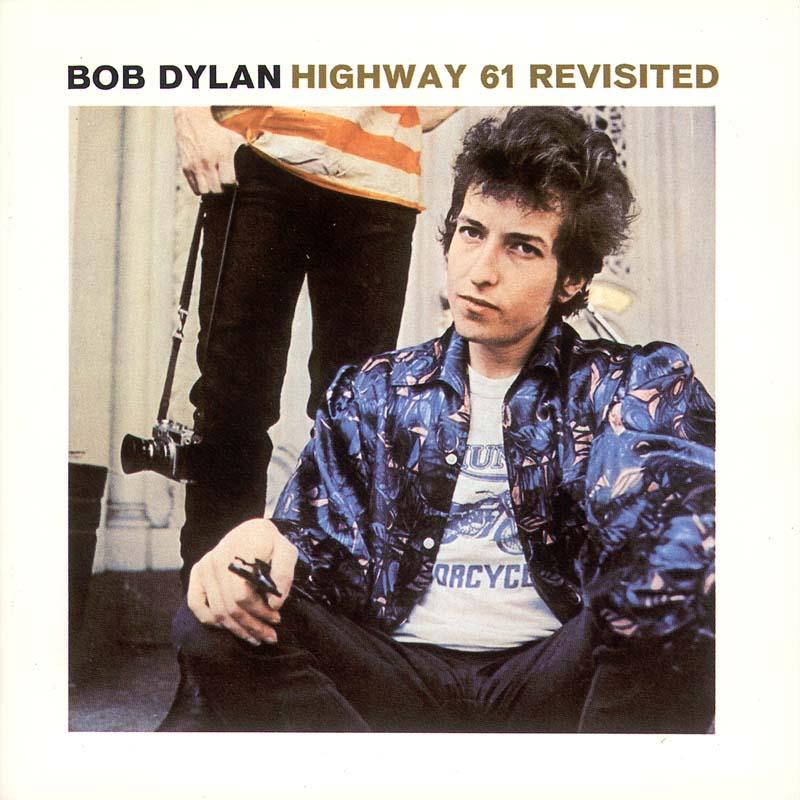
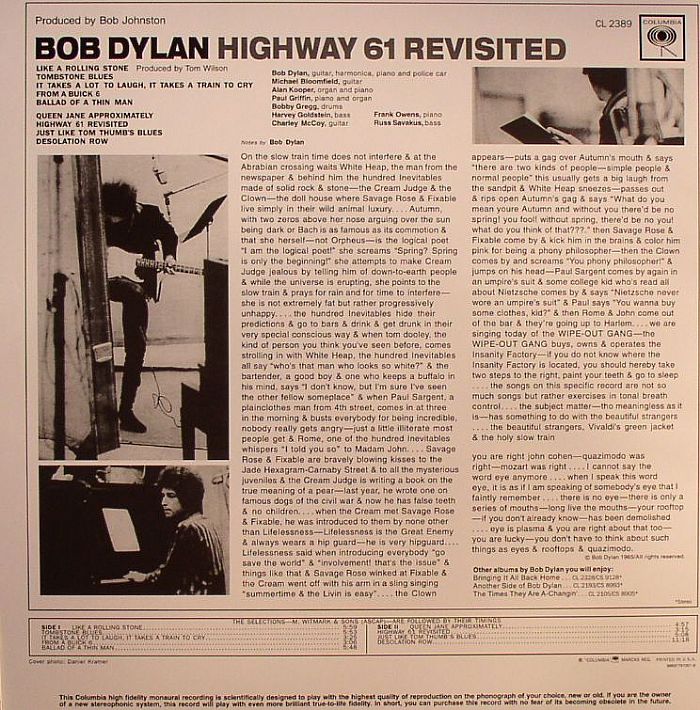
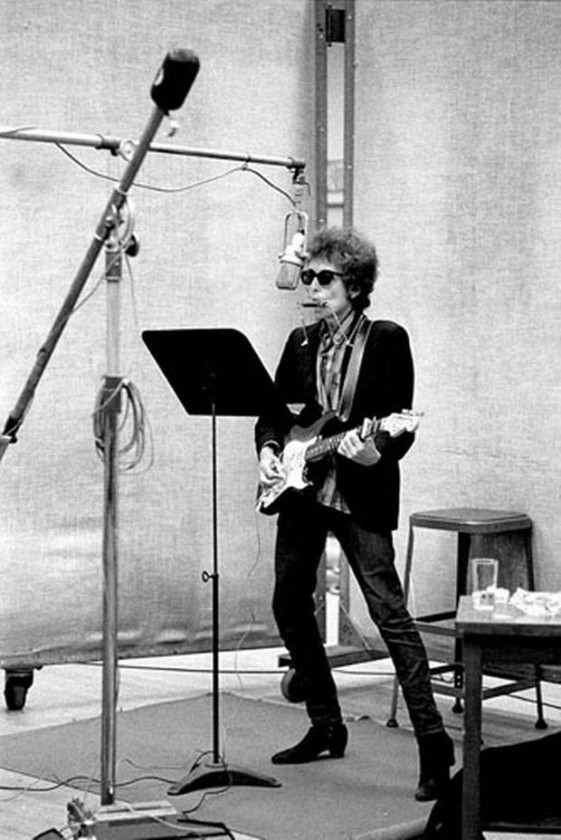
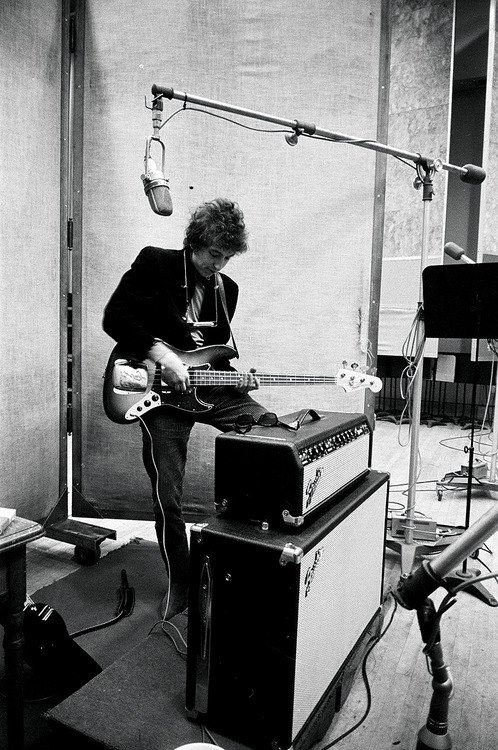
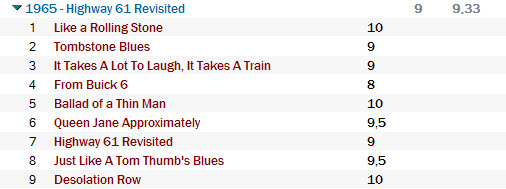
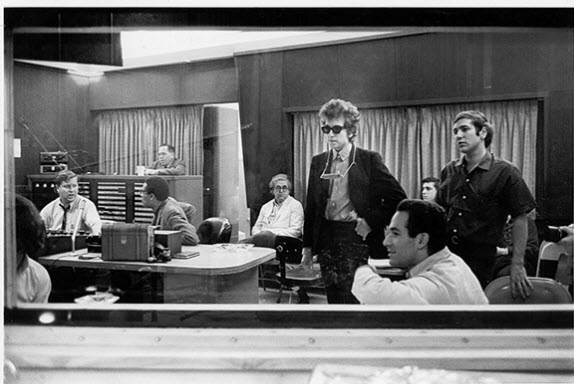
Yes, a pretty good album… haha. I remember failing to discover it until after hearing Blood on the Tracks and diving deeper into this guy’s catalogue, at which point I was blown away by every song on Highway 61. Even later I came to truly appreciate the forces of blues nature that were the title song and It Takes a Lot to Laugh. As I evolved into a true blues aficionado, those two leaped to the top of a long list of favorites and have hovered near there since. Even today, this revelatory album would not be mis-titled as greatest hits. It’s a wonder — maybe a miracle — that Bob has somehow managed to equal and even surpass this gem over and over for 55 years!
So true, it is hard to fathom, thanks for your comments!